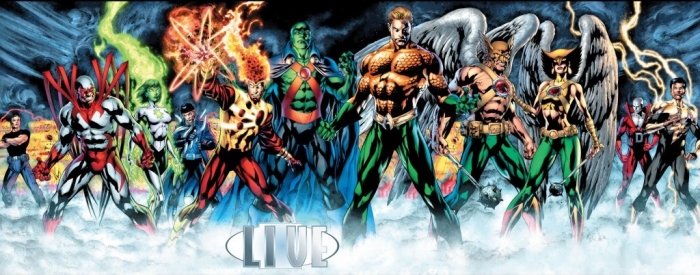You are here
Home › Comics › Where Were You Before the Brightest Day? (or The Need for a Consistent Afterlife) ›Where Were You Before the Brightest Day? (or The Need for a Consistent Afterlife)
FTC Statement: Reviewers are frequently provided by the publisher/production company with a copy of the material being reviewed.The opinions published are solely those of the respective reviewers and may not reflect the opinions of CriticalBlast.com or its management.
As an Amazon Associate, we earn from qualifying purchases. (This is a legal requirement, as apparently some sites advertise for Amazon for free. Yes, that's sarcasm.)

It's been established many times over that the DC Universe has an afterlife. It's been represented in many different forms, but we know that there is (at least) a Heaven and a Hell. Zauriel, a Justice Leaguer, was a wandering angel who gave the team a Grant Morrison inspired tour of Heaven that was too big and too loud for them to take in. Neron upgraded many of our bad guys during Underworld Unleashed in exchange for their souls. Etrigan the Demon has shown us the nether regions on many occasions.
So in the DC Universe, when you die, there are places to go -- even if that place is nowhere in particular, a la Deadman's limbo.
Which got me thinking about the recent wrap on Blackest Night. After seven issues of the dead being reanimated, we end with several characters being truly restored back to the land of the living -- a picky resurrection that only affected a subset of the deceased, with no regard to good or evil. Hawkman and Hawkgirl are restored, as is Aquaman and Firestorm. But also revived are Maxwell Lord, Captain Boomerang (Senior), and Professor Zoom (aka the Reverse Flash).
Why no non-super people got to enjoy a second life -- say, some of the tens of thousands of recently murdered victims of Prometheus -- is a mystery only God (otherwise known in the DCU as Geoff Johns; note that both begin with a capital G) can understand. You have to be a soul that someone in our universe cares about in order to qualify for restoration.
But my question, philosophical and metaphysical though it is, is this: Where were they one minute before the White Lantern did its magic?
Let's assume, for the sake of brevity and without regard to particular dogma, that good guys go to Heaven and bad guys go to Hell (the presence of both being a foregone conclusion, as we've been shown in the past).
One would be led to believe that characters like Aquaman and Hawkman might be less enthused about returning to life. After all, they should have just been yanked out of paradise. Why would they want to return to an Earthly existence? Instead, we have an amnesiac Ronnie Raymond who doesn't seem to know what's going on and, on the other end of the scale, a Hawkgirl who now remembers everything about her past lives but still nothing about her afterlife. Not one of them is disappointed. Not one says, "Aw, geez, why'd you guys bring me back here? I was having such a great time."
Conversely, Max Lord, Digger Harkness, and Eobard Thawne show little in the way of gratitude for their second chance, presuming they'd just been yanked out of the fiery pits and all that. Indeed, they're hardly even penitent, reverting almost immediately to type. Lord takes control of Guy Gardner, and Captain Boomerang is all set to attack Flash. If these guys just left Hell, they don't seem to have learned anything from the experience.
In Blackest Night #8, Green Lantern is replying to Necron about being "allowed" to return back to life: "You might've opened the doorway, but I was the one who walked through it." This prompts Black Hand to ask why. "Life was an accident, Jordan. It has no meaning. It has no purpose." All this, of course, is to set up the Blue Lantern/Flash Barry Allen to deliver the philosophical rejoinder: "Life doesn't give us purpose, Black Hand. We give life purpose."
Which is all well and good, except that Black Hand's point isn't so much rebutted as it is deflected. The question remains, and is only inverted by Allen. What is life's purpose? What purpose do we give life? In a reality populated by physics-defying superheroes who have encountered the "great beyond" a number of times, either through having died themselves or working with or against agents from beyond that veil, in a reality where angels and demons are both superheroes, and where God exists and Hell is a real place, what is the reward for a life well- (or ill-) spent? Shouldn't at least one of the villains fall to his knees, begging, "Please don't send me back to that place!"
We're told that the upcoming Brightest Day will be about second chances. The cynic is me says, "Yes, it's about having a second chance (or fourth) to star in a book that might actually sell for more than a year or two." But perhaps it will delve more deeply into character than that. Perhaps we'll actually see some take advantage of their second chance -- if not those currently resurrected, then perhaps those who have resurrections yet to come (presupposing, of course, that the power of the White Lantern to give life will be a focus of Brightest Day). We know that, at least for a little while, the Trickster James Jesse reformed after serving a stint in hell. Perhaps we'll see other characters take advantage of their new lease on life, to fix their souls or balance their karma, or whatever it is that each of them needs to make their afterlife better than the one they left.


